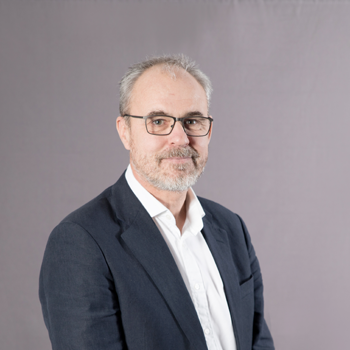
Almost a year into his latest industry role with the senior leadership team at RPS, John Chubb (CEO Consulting UK & Ireland) shares perspectives on the ‘megatrends’, changes and challenges facing firms like RPS operating in the environmental consulting space.
At the Environment Analyst Business Summit: Capitalising on a climate of uncertainty - to be held in London on 19 June - John will address delegates in the opening keynote speech entitled ‘Extinction or rebellion’.

EA: Environment Analyst recently celebrated our 10th anniversary. If you look back ten years what have been the biggest changes for RPS and the wider sector during that time?
JC: Congratulations! The exponential increase in service demand is probably the biggest change we’ve seen. Another significant shift is how sustainability, carbon and waste has shot up the agenda, and that has led to increasing demand from clients and regulators that we’ve had to respond to.
The profile of the projects that are out there has also changed – over the last 10 years we have seen many more ‘supersized’ major infrastructure projects like HS2 and Hinkley Point C and these projects have changed the dynamic of the sector. If you are involved in one of these supersize projects, the commitment is huge in terms of internal resource. But also, for those not involved with the big projects, the competitor landscape is very different. When firms are involved in the super projects they often don’t have the resource to go for other work. As a result, the line-up for bids can be unexpected.
On the back of being involved in these larger projects, we have been exposed to a wider range of more diverse projects, and our ability to prove ourselves in them has opened the door to more fantastic opportunities and has helped us build strong, positive client relations.
EA: And looking forward to the next ten years there is of course so much uncertainty...how as a business how do you prepare for the unknown on so many levels (politically, economically, regulatory, technologically, etc)?
JC: There is always going to be uncertainty – the best way to deal with that is to be agile. Firms like ours need to try and predict what is coming down the line and plan pragmatically for a range of events. At the same time, you can’t over commit in case it plays out differently. Having diversity in the services you offer and skills you can provide is key and you need to be ready to deploy them.
Political uncertainty doesn’t mean life stops – for example environment laws will carry on despite Brexit and our clients will still expect a high value of sustainability and environmental best practice which we will deliver. What we don’t know is what the red tape will mean for us as a business, and that is what we must be ready to respond to. From a digital perspective, we are adopting and working with new innovations in technology which provides so many more flexible creative options to explore and interrogate a project to find and plan the very best service.
EA: What are the pros and cons of competing as a 'best in class' mid-size firm with both the smaller specialists and more diversified firms like AECOM, Wood, Stantec…?
JC: RPS’ scale means we are perfectly placed to solve problems that matter (our clients have told us so) but not too large to lose the personal service/approach. Bigger is not necessarily better, and for us it also works well at an employee level because our people feel they are part of something significant, but you don’t get lost in the machine.
Our mid-sized sweet spot in the market gives us the agility and flexibility to connect our diverse team of talent to repeatedly create innovative solutions to problems that are often complex and to present them to our clients in a way that makes them easy to understand. This gives us a unique and highly valued rapport with our clients. We have the scale, diversity and density in our services to weather financial cycles and crises. We have good access to market information – and we are close to our target audience. This means we are aware of changes that are about to happen which positions us well to adapt to changing market conditions.
Our size makes us easy to connect with. Our decision-making ability is fast and local – our CEO is only ever a few hours away, and our teams are super at collaborating.
What is harder in a mid-sized rather than large company is having a big enough pool of quality people ready to deploy on the super-sized projects we’ve already talked about that doesn’t mean that other client work has to come to a halt. The other thing is brand awareness and making sure that people know the breadth and scope of what we can get involved with. Our brand relaunch in January was a really important step change as it has given us a voice that is commensurate with our size and means we can punch above our weight (EA 23-Jan-19).
EA: In an employee's market, and with a workforce increasingly dominated by millennials, is it your experience that EC business managers are spending more and more time simply trying to keep hold of their staff?
JC: We’ve found the issue of retention is not isolated to millennials. The state of the market, with unemployment at its lowest level for many years, means the job market is buoyant and the battle for talent is real. Skilled people, like those who work in our industry, and a huge amount of choice increases the pressure on companies. In a professional services business, your people are your greatest asset so if you don’t commit fully to developing and nurturing your staff then you will lose them. We believe that our managers should be spending more time with our team in developing them; we have the experience and diversity to offer and are committed to developing this culture.
EA: Statistics show a clear link between workforce diversity and financial performance. Yet the wider consulting & engineering sector is one of the least diverse professions historically. How is RPS addressing this?
JC: As a global firm, operating in 125 countries, we’re as diverse as the communities and clients we represent. We are proud of our gender diversity at a Board level with a ratio of 4:3 men to women and we are working hard to make sure balance is felt through the organisation. Recently we’ve got involved with the 2019 #genderchampions campaign which aims to get men in the property and development industries to be more proactive in achieving better gender balance.
EA: What about the impact of digital transformation on the skill sets required?
JC: We recognise that technology is changing the way we work and that our people and clients are having to adapt to these changes. We know our teams want to use the newest digital age technologies to improve their ability to deliver projects to clients and make day to day working life easier.
Our digital transformation strategy has been designed to maximise the combined value of our deep expertise, our data and the way we use immersive technologies to deliver unique client experiences. This includes automating away process-heavy activities and creating globally connected knowledge communities for our geospatial, BIM and VR talent, and investing in a data strategy so that in time we can generate insights about our people and our clients and be more responsive to their feedback and needs. We also know we need to invest in future skill sets, like data analysis, so our digital transformation strategy has dovetailed with our technology and people objectives to make sure we proactively recruit for data and digital acumen while also upskilling our current ‘good to great’.
-----
John Chubb will be co-chairing and delivering the opening keynote speech at the fifth annual Environment Analyst Business Summit - Capitalising on a climate of uncertainty on 19 June 2019 in London. To view the full programme click here.
To reserve your place at the conference click here.
--------
John Chubb
Chief Executive Officer Consulting UK and Ireland, RPS
John has over 25 years’ experience in a broad range of environmental consulting and engineering management roles, and for the past eight years has held leadership positions, including with Grontmij UK and Sweco Denmark, also serving on their Executive Committees, whilst concurrently holding roles of Executive Chairman for Grontmij Sweden, and Grontmij UK. Chartered Engineer John is a former Royal Naval Commander and has further senior leadership experience in the nuclear, ICT, waste and energy sectors. He joined RPS in 2018 as CEO of Consulting UK and Ireland.

